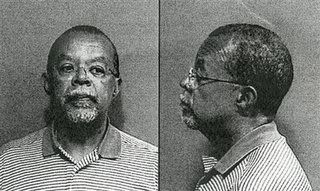Gates's interview with CNN's Soledad O'Brien yesterday:
GATES: Well, I was filming my new documentary series for PBS called "Faces of Americans," it's about immigration. And we were filming Yo-Yo Ma's ancestral cemetery for a week in China. It was fantastic. And my daughter and I -- I took my daughter along. And we had just flown back from China.
I came from New York to Boston. And my driver picked me up. We got to my house in Harvard Square and the door was jammed. The door wouldn't open. And to make a long story short, I asked my driver just sort of to push the door through. I gave him his tip, he left.
I called Harvard Real Estate, which does the maintenance on my house because they own the house. And while I was on the phone, a Cambridge policeman showed up on my porch. I walked with the phone still active to my porch and he demanded that I step out of my house on to the porch.
That's all he said. He said, I would like to you step outside. I said, absolutely not. I said, why are you here? He said, I'm investigating a breaking and entering charge. I said, this is my house, I'm a Harvard professor, I live here.
He said, can you prove it? I said, just a minute. I turned my back. I walked into the kitchen to get my Harvard ID and my Massachusetts driver's license. He followed me without my permission. I gave him the two IDs and I demanded to know his name and his badge number.
O'BRIEN: And when you demanded that, what did he say?
GATES: He wouldn't say anything. He was just very upset. He was trying to figure out who I was. He was looking at the ID. He didn't say anything. And I said, why are you not responding to me? Are you not responding to me because you're a white police officer and I'm a black man?
He turned, walked out -- turned his back on me, walked out. I followed him on to my porch. It looked like a police convention, there were so many policemen outside. I stepped out on my porch and said, I want to know your colleague's name and his badge number.
And this officer said, thank you for accommodating my earlier request, you are under arrest. And he slapped handcuffs on me and they took me to jail.
O'BRIEN: Originally they put the handcuffs behind your back.
GATES: They put the handcuffs behind my back. And I told them that I was handicapped, I used a cane. They had a debate. There was a black officer there who was very sensitive. He persuaded them to move the handcuffs from around the back to the front. They took me to the Cambridge Police station and booked me, fingerprints, mug shot, which has now been all over the universe.
O'BRIEN: I've got to tell you, to see -- I mean, Professor Gates, I had him in college. And you know, to have that shot, your mug shot, it is quite a shock to see. What was that moment like for you?
GATES: It was terrifying. And I realized…
O'BRIEN: Were you afraid?
GATES: I knew that I was in danger but I knew, too, that as soon as my friends could get to jail, starting with Professor Charles Ogletree, who is my friend and lawyer, that eventually I would be OK.
But what it made me realize was how vulnerable all black men are, how vulnerable all people of color are and all poor people to capricious forces like a rogue policeman. And this man clearly was a rogue policeman.
O'BRIEN: The police report said he described you as behaving in a tumultuous manner.
GATES: Yes, look how tumultuous I am. I'm 5'7", I weigh 150 pounds. And my tumultuous, outrageous action, Tom, was to demand that he give me his name and his badge number. Soledad, why? Because if I had stepped out on the porch -- it is important for all people to know this about the police.
If I had stepped outside of my house, he couldn't come in my house legally without a warrant. He couldn't arrest me without a warrant. Had I stepped outside he would have slapped handcuffs on me for being under suspicion of breaking and entering because he was responding to a profile.
Two black men with backpacks were breaking and entering into my home. And when he see me, he just presumed that one of them was me.
O'BRIEN: A neighbor called 911. I mean, it was a neighbor of yours who said that description, two black men breaking into your house. Are you angry with your neighbor?
GATES: No. In fact I hope right now that if someone is breaking into my house this nice lady is calling the police. I have a lot of valuable art and books in that house. And in fact, I think I'm going to send this person some flowers. I hope she is watching. I know that she must be intimidated and she must think that I'm very angry.
It wasn't her fault. It was the fault of the policeman who couldn't understand a black man standing up for his rights right in his space. And that's what I did. And I would do the same thing exactly again.
O'BRIEN: The charges were dropped.
GATES: Charges were dropped and the mayor of Cambridge, God bless her, called me and apologized to me. And my lawyers and I are considering what further action. Because this is…
O'BRIEN: What does that mean? Does that mean lawsuit?
GATES: Perhaps. Because this is not about me. This is about the vulnerability of black men in America.






